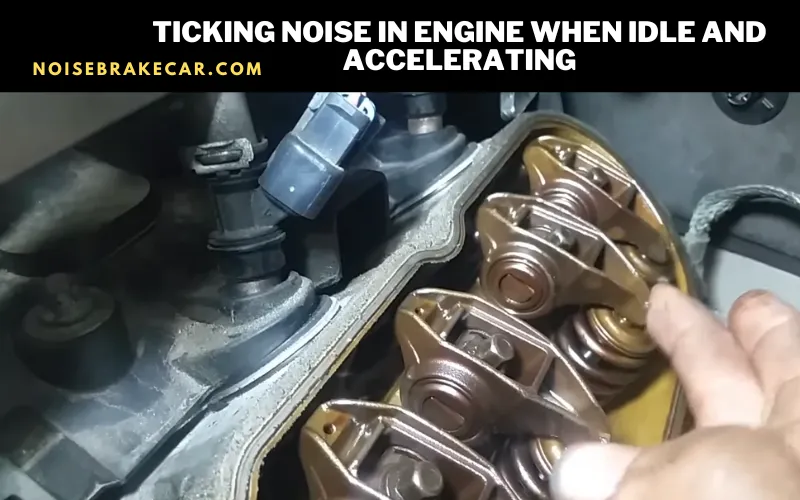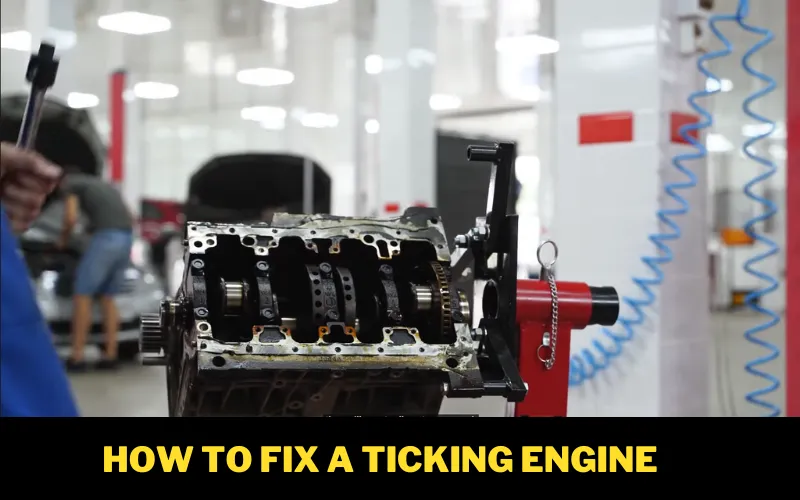The last thing you want to hear while driving is engine noise. It’s scary, and there are good reasons for it. This can lead to serious engine damage. The noise is unusual. It is important to understand how to deal with engine noise and responses before serious problems arise. We are investigating its origins engine parts in this article. We will also talk about the difference between a mechanical engineer and a mechanical engineer. Finally, we will address your immediate problems and suggest some solutions.
Common 7 Causes Ticking Noise in Engine
- Low Oil Level
- Engine not Warm or Used Frequently
- Bad Hydraulic Lifter
- Poor Oil Quality or Worn Viscosity
- Low Oil Pressure
- Leaking Exhaust Manifold Gasket
- Worn Engine
1) Low Oil Level
This system if is high the tics will stop which is usually a low result oil. A lack of oil in the engine will cause it to slow down and start to spin. The ticking noise may increase when you accelerate or apply too much force to the vehicle.
The risk increases if you add an excessive amount of oil and the level drops. It is preferable to repair the cracks rather than attempting to make it worse.
2) Engine not Warm or Used Frequently
Engine Not Warm or Used Frequently The engine may occasionally tick while it warms up. The oil becomes thinner as the engine heats up, which facilitates easier motor circulation. The oil may never get warm enough to thin out if you aren’t driving the car frequently enough or far enough.
Modern cars don’t need their engines to warm up before they are driven. Still, for the engine to perform at its peak, you must drive for a sufficient amount of time and at a reasonable pace.

3) Bad Hydraulic Lifter
A motor without a hydraulic motor opens and closes hydraulically. Lifters can also finally place it Cannot open and close directory. This problem causes ticks, which are clicking sounds. Heavy lifting fitted to old car. If the uninstallation fails, this may cause a clock-like problem.
4) Poor Oil Quality or Wrong Viscosity
Poor Oil Quality or Wrong Viscosity The issue might also arise if you haven’t changed the oil and filter in a while. Performance problems can arise due to a blocked filter or insufficient oil, which can cause pressure drop. In any case, the combustion engine is not in need of sufficient oil.
5) Low Oil Pressure
A few potential causes of the car’s low oil pressure have already been covered. Nevertheless, this issue can also arise for mechanical reasons, all of which can result in ticking. Low fuel pressure may have various causes, like an obstructed oil filter or a malfunctioning oil pump.
6) Leaking Exhaust Manifold Gasket
Gases are diverted from the engine by the exhaust manifold. The exhaust manifold’s gasket is susceptible to deterioration and failure. There is a leak as a result. Particularly at lower RPMs, the engine begins to tick as exhaust gases leak from the manifold. If the leak isn’t the cause of the leak, the cause is a crack in the pipe.
7) Worn Engine
Worn Engine There are numerous moving parts inside the engine that may deteriorate with time. Noise levels may increase as the engine’s internal components begin to deteriorate.
If these noises aren’t stopped sooner, they will eventually get worse and require extensive repairs. The need for an engine rebuilds or replacement may arise depending on how bad things get.
How to Fix a Ticking Engine?
You want to identify the issue and fix it as soon as you hear an engine ticking. By taking immediate action, you can avoid more serious and costly issues. Here’s how, as qualified mechanics, we respond to this circumstance.

Check the Oil Level
To begin with, it is important to keep the engine well lubricated. The oil level can be checked with a dipstick to determine if it’s time to add more. If you keep adding oil, you should check for potential leaks. If not, there’s a chance that the oil is leaking internally, which could occur from a burst head gasket.
Change the Oil and Filter
It’s time to replace the oil if the inspection reveals that it appears contaminated. Upon draining the oil, use high-quality cold water to cool it down. Don’t forget to change the filter sometimes. Also take used oil to a safe place for recycling. Most car parts store oil for free.
Check Oil Pressure
To ensure safety, it’s recommended to check the oil pressure in your vehicle. If the oil pressure drops, find the cause. This gauge isn’t always precise, though. For this reason, if you hear a ticking sound, we recommend checking the oil pressure manually. A flawed reading could be the result of a problem with the sensor or gauge.
Let The Engine warm up completely for the oil to flow normally, the engine must reach its normal operating temperature. Allow the engine to warm up fully if you only hear a ticking sound when you first start it. To facilitate easier flow, you might also think about adjusting the viscosity of the oil. To find out what viscosity you should use, consult the owner’s manual or seek further assistance from a mechanic.
Diagnose Hydraulic Lifters No matter the engine’s temperature, the lifters are most likely to blame if the engine is constantly ticking. Replace the hydraulic lifter if it’s malfunctioning. Although you could replace just one, we usually advise replacing them all because the others might break soon. But only a professional should handle this as it’s a complex procedure.
Look For Exhaust Manifold Leaks
If you listen for an exhaust leak, you might be able to locate it. While the engine is cold, start it and listen for any manifold noises. At the leak’s origin, soot stains might also be visible. To find the leak, you might need to remove the exhaust manifold, depending on your car and the extent of the issue. Look for tiny cracks that could allow exhaust to seep through. It might also be necessary to use a flashlight for this inspection.
Contact A Professional
It is advisable to seek assistance if you are experiencing difficulty identifying the core of the issue. For auto repair, we advise contacting an ASE-Certified Technician because they have received the necessary training. Diagnostics are not free; usually, there is a fixed charge. Before any work is done, you ought to be able to obtain a thorough estimate once the issue has been identified.